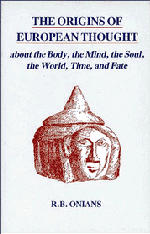Introduction: The Earliest Greeks
Published online by Cambridge University Press: 06 August 2010
Summary
Basic to modern European thought are Greek philosophy and science. It is usual to begin their study with Thales, Anaximander, and their successors in the sixth century b.c., not the roots but the lowest surviving branches of a far mightier tree. Through the centuries behind stretches the parent stem, the thought of the race, the system of beliefs whereby the race rendered intelligible to itself for many generations the life of man and the world in which man lives; a working faith, slightly different, doubtless, in one quarter than in another, and growing gradually with the thoughts of individuals whose contributions cannot now be distinguished and whose names are for ever lost. Its roots are buried deep as the converging races from whose happy union sprang the stock we know. Later ‘philosophies’, the theories of individuals and of schools, are criticisms and improvements, ever more far-reaching, upon this racial scheme, and are not likely to be understood aright except in relation to it. In itself, if it could be recovered, it must be supremely interesting, the fundamental beliefs concerning life and mind and human destiny, beliefs determining the words and the actions of every man. And not only for the Greeks. In a sense we shall be exploring the roots of civilisation in Europe and beyond. It will, I think, appear that the fundamental beliefs traceable in the language and the earliest literature of Greece and Rome were shared by the Germanic, Celtic, and other peoples; were, in some cases at least, already current in the Old Stone Age, explaining curious practices then; and live on unrecognised in customs and idioms of to-day.
- Type
- Chapter
- Information
- The Origins of European ThoughtAbout the Body, the Mind, the Soul, the World, Time and Fate, pp. 1 - 10Publisher: Cambridge University PressPrint publication year: 1988

